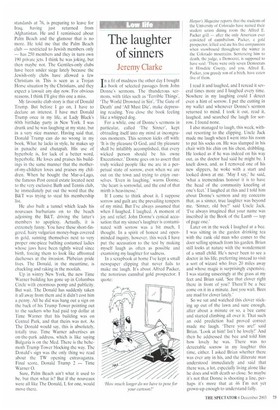The laughter of sinners
Jeremy Clarke
In a fit of madness the other day I bought a book of selected passages from John Donne's sermons. The thunderous sermons, with titles such as 'Terrible Things', 'The World Drowned in Sin', 'The Gate of Death' and 'All Must Die', make depressing reading. You close the book feeling like a whipped dog.
For a while, one of Donne's sermons in particular, called The Sinner', kept obtruding itself into my mind at incongruous moments. This sermon kicks off with: 'It is thy pleasure 0 God, and thy pleasure shall be infallibly accomplished, that every wicked person should be his owne Executioner.' Donne goes on to assert that truly wicked people like me are in a perpetual state of sorrow, even when we are out on the town and trying to enjoy ourselves. 'Even in laughing.' warns Donne, 'the heart is sorrowful. and the end of that mirth is heavinesse.'
If I come to think about it. I suppose sorrow and guilt are the prevailing tempers of my mind. But I've always assumed that when I laughed, I laughed. A moment of joy and relief. John Donne's cynical accusation that my sinner's laughter is contaminated with sorrow was a bit much. I thought. In a spirit of honest and openminded inquiry, however, this week I have put the accusation to the test by making myself laugh as often as possible and examining my laughter for sadness.
In a scrapbook at home I've kept a small newspaper clipping that never fails to make me laugh. It's about Alfred Packer, the notorious cannibal gold prospector. I quote:
Harpers Magazine reports that the students of the University of Colorado have named their student union dining room the Alfred E. Packer grill — after the only American ever convicted of cannibalism. Packer, a gold prospector, killed and ate his five companions when snowbound throughout the winter in the Colorado mountains, Sentencing him to death, the judge, a Democrat, is supposed to have said: 'There were only seven Democrats in Hinsdale County, and you, Alfred E. Packer, you greedy son of a bitch, have eaten five of them.
I read it and laughed, and I reread it several times more and I laughed every time. Nowhere in my laughing could I detect even a hint of sorrow. I put the cutting in my wallet and whenever Donne's sermon returned to mind. I took it out, read it, laughed, and searched the laugh for sorrow. I found none.
I also managed to laugh, this week, without resorting to the clipping. Uncle Jack made me laugh when I went into his room to put his socks on. He was slumped in his chair with his chin on his chest, dribbling. He looked as if he was indeed on his way out, as the doctor had said he might be. I knelt down, and, as I removed one of his new slippers, he woke with a start and looked down at me. 'May I say,' he said, 'what a tremendous honour it is to have the head of the community kneeling at one's feet.' I laughed at this and I told him about Donne's sermon and my concerns that, as a sinner, true laughter was beyond me. 'Sinner, old boy?' said Uncle Jack. 'I've always imagined that your name was inscribed in the Book of the Lamb — top of page one.'
Later on in the week I laughed at a bee. I was sitting in the garden drinking tea with the rank old man who comes to the door selling spinach from his garden. Brian still looks at nature with the wonderment of a small child. He's never been to see a doctor in his life, preferring instead to visit a sort of wizard who lives 20 miles away and whose magic is surprisingly expensive. I was staring unseeingly at the grass at my feet and Brian said. 'See that clover right there in front of you? There'll be a bee come on it in a minute. Just you wait. Bees are mad for clover lately.'
So we sat and watched this clover sticking up out of the lawn and sure enough, after about a minute or so, a bee came and started climbing all over it. That such an odd prediction had proved correct made me laugh. 'There you are!' said Brian. 'Look at him! Isn't he lovely!' And then he addressed the bee and told him how lovely he was. There was no detectable sorrow in my laughter this time, either. I asked Brian whether there was ever any in his, and the illiterate man understood immediately and said that there was, a lot, especially living alone like he does and with death so close. So maybe it's not that Donne is shooting a line, perhaps it's more that at 46 I'm not yet grown-up enough to understand fully.


























































































 Previous page
Previous page